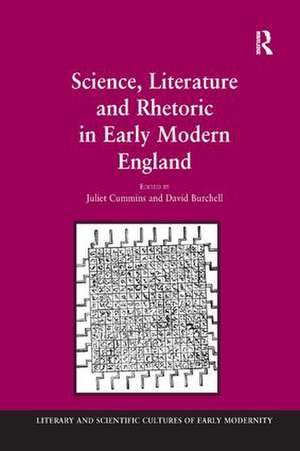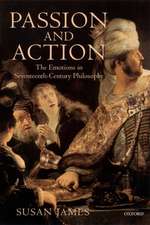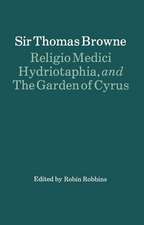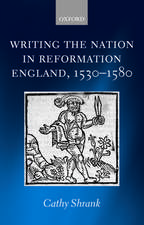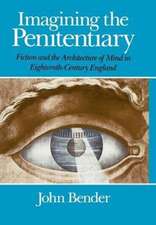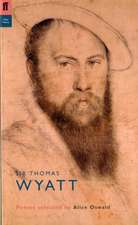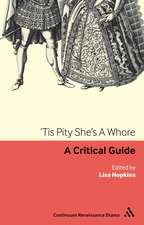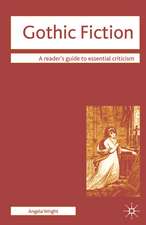Science, Literature and Rhetoric in Early Modern England: Literary and Scientific Cultures of Early Modernity
Autor David Burchell Editat de Juliet Cumminsen Limba Engleză Paperback – 15 noi 2016
| Toate formatele și edițiile | Preț | Express |
|---|---|---|
| Paperback (1) | 469.34 lei 6-8 săpt. | |
| Taylor & Francis – 15 noi 2016 | 469.34 lei 6-8 săpt. | |
| Hardback (1) | 1057.89 lei 6-8 săpt. | |
| Taylor & Francis – 28 noi 2007 | 1057.89 lei 6-8 săpt. |
Din seria Literary and Scientific Cultures of Early Modernity
- 23%
 Preț: 322.12 lei
Preț: 322.12 lei - 16%
 Preț: 338.06 lei
Preț: 338.06 lei - 26%
 Preț: 822.01 lei
Preț: 822.01 lei - 25%
 Preț: 324.84 lei
Preț: 324.84 lei -
 Preț: 469.34 lei
Preț: 469.34 lei - 18%
 Preț: 1120.23 lei
Preț: 1120.23 lei - 16%
 Preț: 260.73 lei
Preț: 260.73 lei -
 Preț: 469.34 lei
Preț: 469.34 lei -
 Preț: 489.26 lei
Preț: 489.26 lei - 13%
 Preț: 309.88 lei
Preț: 309.88 lei -
 Preț: 489.26 lei
Preț: 489.26 lei -
 Preț: 489.26 lei
Preț: 489.26 lei -
 Preț: 389.38 lei
Preț: 389.38 lei - 31%
 Preț: 764.45 lei
Preț: 764.45 lei - 26%
 Preț: 765.59 lei
Preț: 765.59 lei - 26%
 Preț: 792.44 lei
Preț: 792.44 lei
Preț: 469.34 lei
Nou
Puncte Express: 704
Preț estimativ în valută:
89.81€ • 93.77$ • 74.33£
89.81€ • 93.77$ • 74.33£
Carte tipărită la comandă
Livrare economică 04-18 aprilie
Preluare comenzi: 021 569.72.76
Specificații
ISBN-13: 9781138265318
ISBN-10: 1138265314
Pagini: 256
Dimensiuni: 156 x 234 x 14 mm
Greutate: 0.45 kg
Ediția:1
Editura: Taylor & Francis
Colecția Routledge
Seria Literary and Scientific Cultures of Early Modernity
Locul publicării:Oxford, United Kingdom
ISBN-10: 1138265314
Pagini: 256
Dimensiuni: 156 x 234 x 14 mm
Greutate: 0.45 kg
Ediția:1
Editura: Taylor & Francis
Colecția Routledge
Seria Literary and Scientific Cultures of Early Modernity
Locul publicării:Oxford, United Kingdom
Cuprins
Contents: Introduction; 'The fashioned image of poetry or the regular instruction of philosophy'? Truth utility and the natural sciences in early modern England, Peter Harrison; Mapping regeneration in The Winter's Tale, Anne Sutherland; 'A plain blunt man': Hobbes, science and rhetoric revisited, David Burchell; Reformed catechism and scientific method in Milton's Of Education and Paradise Lost, Angelica Duran; Rewriting the revolution: Milton, Bacon and the Royal Society rhetoricians, Catherine Gimelli Martin; A philosophical duchess: understanding Margaret Cavendish and the Royal Society, Peter Dear; Literary responses to Robert Boyle's Natural Philosophy, Peter Anstey; Milton's Chaos in Pope's London, Sophie Gee; Global analogies: cosmology, geosymmetry and skepticism in some works of Aphra Benn, Robert Markley; Bibliography; Index.
Notă biografică
Juliet Cummins is Honorary Research Advisor in the English Department at the University of Queensland, Australia. David Burchell is Senior Lecturer in the School of Humanities at the University of Western Sydney, Australia.
Recenzii
’... succeeds in assembling wide-ranging and frequently provocative studies that, individually and collectively, mark a welcome contribution to the field... This fine collection provides a wealth of material and rhetorical modes of framing and reframing natural philosophy in the early modern period, particularly during the late seventeenth century.’ Renaissance Quarterly ’Realizing that disciplinary centers do not hold in our own space and time any more than they did for past cultures, these skillful interdisciplinary scholars illustrate the ongoing complexity, value and importance of crafting their own content and rhetoric to construct and communicate knowledge within and across multiple audiences simultaneously.’ Early Science and Medicine 'The editors set out to provide scholars and students of early modern studies with a new way to understand disciplinary interactions of the period. Certainly, they achieve this goal, but this collection is an intriguing and sturdy starting point for more endeavours of the sort, a necessity of the project's vast aim.' Renaissance Studies '... a useful and interesting volume.' British Society for Literature and Science
Descriere
These essays throw new light on the complex relations between science, literature and rhetoric as avenues to discovery in early modern England. Analyzing the contributions of such diverse writers as Shakespeare, Bacon, Hobbes, Milton, Cavendish, Boyle, Pope and Behn to contemporary epistemological debates, these essays move us toward a better understanding of interactions between the sciences and the humanities during a seminal phase in the development of modern Western thought.
